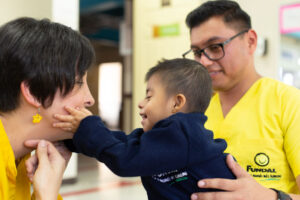Parent Training

Parent training is a very important related service, especially when it comes to Active Learning. Though many parents are early adopters of Active Learning and bring the approach to their team, an equal number of parents and caregivers know nothing about the approach. They may be reluctant to endorse this educational practice without learning more about the approach’s principles.
When the educational team convenes, special attention should be given to creating a plan to provide information and support to parents in learning about Active Learning. This might include sharing this website, guiding them to the Active Learning online modules and webinars, getting them signed up for the Active Learning Space newsletter, and showing the specific sections of the website. For example, if one of their priorities is getting their child to sit independently you might want to show them how the Support Bench can be used to build neck and torso strength needed to sit up. If they are interested in helping their child work on dressing or undressing you might show them the pages on Activities of Daily Living.
Assessment
Parents and caregivers play a critical role in the assessment of children with significant developmental disabilities. This is especially true when completing the Functional Scheme. They should have input on every section, but their insights are especially valuable in completing these sections:
- Developmentally impeding functions
- Toileting Skills
- Undressing and Dressing Skills
- Personal Hygiene Skills
- Eating Skills
- Social Perception
- Emotional Perception
A good way to approach the Functional Scheme related to parent involvement is for the team to complete the assessment first then review and revise with the parents during a face-to-face meeting. They can be especially helpful in identifying behaviors that might have been present at one time and disappeared. They may benefit from reviewing these pages about assessment on Active Learning Space:
Supporting Instruction at Home
Every educator knows that parents who support their child’s learning at home are invaluable. Many parents have been instrumental in bringing information to the team about Active Learning and have been incredibly creative in setting up Active Learning activities and environments in their home. If you doubt it, just check out the Family section of this website. If you provide just a few resources to most families they will take it and run with it.
Here are a few suggestions of videos you may want to share with your families who are interested in learning more about Active Learning:
Live in the D: Lives changed at Penrickton Schools
Link to the video on the Detroit Fox news center to hear from a mom about the benefits of Active Learning for her son, Jack.

Play Full Video
Developmentally Appropriate Activities
This video is designed to show you what happens when a typical 2-year-old child is presented with tasks that are at a developmental level that is far above her functioning level.
Play Full Video
Downloads:
Jack’s Progression
This video shows the progression of a boy over a period of approximately 4 years, from lying prone on a Resonance Board to sitting up independently.
Play Full Video
Downloads:
